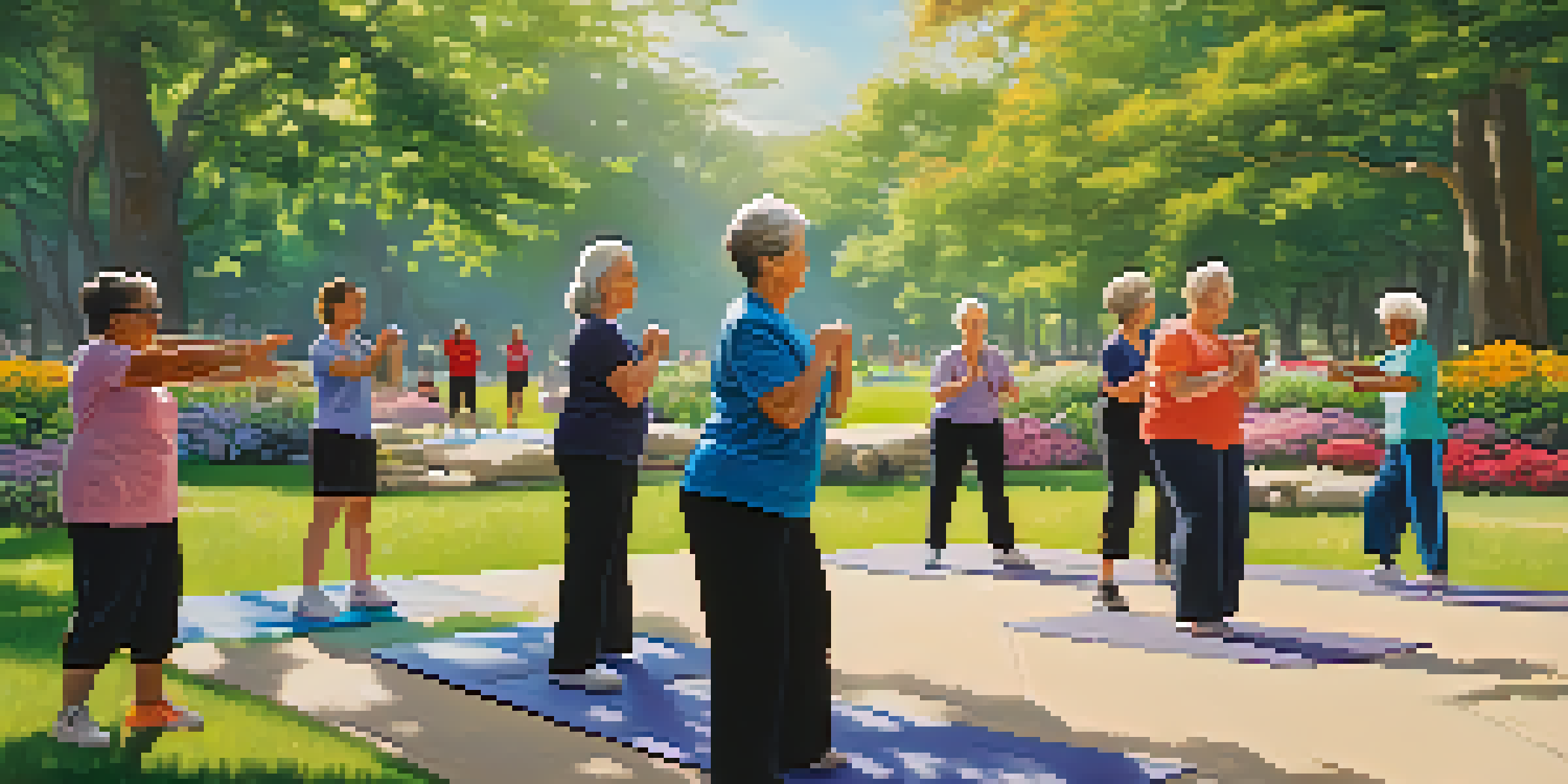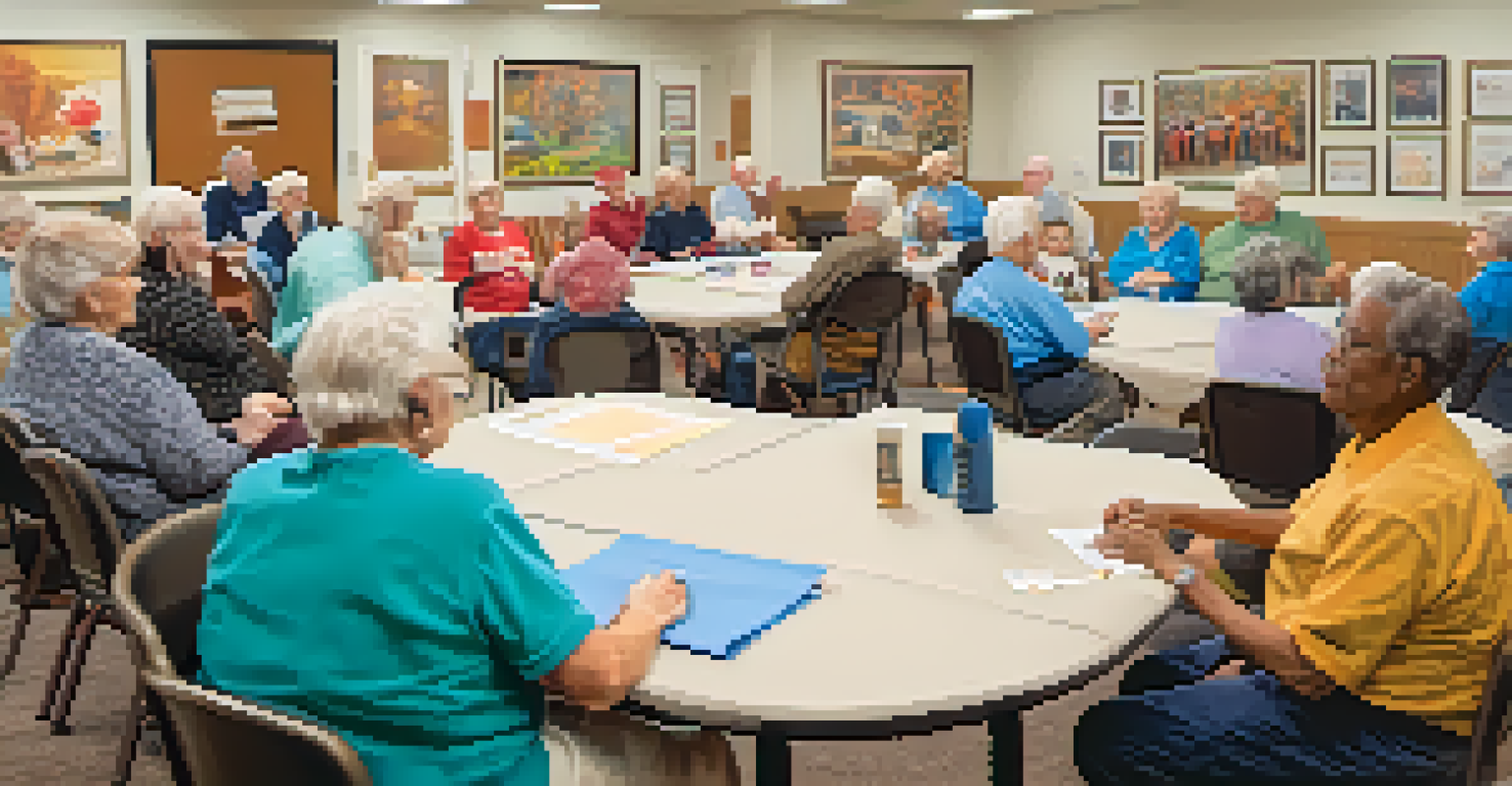Essential Self Defense Techniques for Seniors Over 60 Years Old

Understanding the Importance of Self Defense for Seniors
Self-defense is not just for the young and fit; it's a crucial skill for seniors too. As we age, we may become more vulnerable to threats, making it essential to know how to protect ourselves. Learning self-defense can boost confidence and provide peace of mind, knowing you have the skills to handle unexpected situations.
The best way to predict the future is to create it.
It's important to recognize that the goal of self-defense is not to engage in a fight but to escape safely. This mindset helps seniors focus on techniques that prioritize safety and evasion rather than confrontation. By understanding this, seniors can approach self-defense with a more positive and empowering outlook.
Additionally, self-defense training can foster social connections, as many classes are group-oriented. This not only promotes physical activity but also encourages camaraderie among participants. In this way, self-defense becomes a holistic approach to personal safety and community building.
Basic Awareness and Prevention Strategies
The first step in self-defense is being aware of your surroundings. Seniors should practice mindfulness and stay alert to changes in their environment. Simple habits, like avoiding distractions from phones when walking, can greatly enhance personal safety.

Preventive strategies also include planning your routes and choosing well-lit areas for walking. Informing friends or family about your whereabouts can add an extra layer of safety. These small adjustments can significantly reduce the risk of encountering dangerous situations.
Self-Defense Empowers Seniors
Learning self-defense boosts confidence and ensures seniors can protect themselves from potential threats.
Finally, consider enrolling in local safety workshops that focus on awareness and prevention. Many community centers offer free or low-cost classes tailored for seniors. These sessions can provide valuable information on recognizing potential threats and reacting appropriately.
Effective Communication as a Defense Tool
Communication can be a powerful tool in self-defense. Verbal skills can help de-escalate a situation before it becomes physical. Seniors can practice assertive communication, which conveys confidence and discourages potential aggressors.
It’s not the years in your life that count. It’s the life in your years.
Using a firm voice to express discomfort or demand space can often deter unwanted attention. Phrases like 'I don't want any trouble' can signal that you are aware and ready to protect yourself. It's about setting boundaries and making it clear that you will not be an easy target.
Role-playing different scenarios with friends or family can also help seniors become more comfortable with assertive communication. This practice allows for real-time feedback and adjustments, making the response feel more natural in stressful situations.
Basic Physical Techniques for Personal Safety
While physical strength may diminish with age, effective self-defense techniques do not rely solely on brute force. Simple moves, like wrist releases or using your body weight to shift an aggressor's balance, can be highly effective. These techniques are designed to empower rather than overpower.
Learning how to position your body can also create an advantage in self-defense. For instance, standing sideways can make you a smaller target, while maintaining a stable stance can help you react quickly. Practicing these movements in a safe environment builds muscle memory and confidence.
Awareness Enhances Safety
Practicing mindfulness and planning safe routes can significantly reduce risks and improve personal safety for seniors.
Consider taking a self-defense class specifically designed for seniors, which focuses on techniques suitable for various physical abilities. Many instructors emphasize practical skills that prioritize safety, ensuring that everyone can participate and learn effectively.
Using Everyday Objects as Self-Defense Tools
Seniors can leverage everyday objects for self-defense, turning items like keys or umbrellas into tools for protection. For example, holding keys between your fingers can create a makeshift weapon if needed. The key is to use what you have at hand creatively and effectively.
An umbrella can not only shield against rain but can also serve as a defensive tool. A quick jab or a blocking maneuver can create enough space to escape from an attacker. Thinking of common items as potential aids can empower seniors in unexpected situations.
It's essential to practice using these objects in a controlled setting. Familiarity with how to wield them effectively can boost confidence and improve reaction times in real-life scenarios. Engaging in drills or exercises can make these techniques second nature.
The Role of Technology in Personal Safety
Technology can significantly enhance personal safety for seniors. Mobile apps that allow you to share your location with trusted contacts can be reassuring. Additionally, panic buttons or wearable devices can alert authorities in case of an emergency.
Smartphones also offer a wealth of resources, from self-defense videos to local safety tips. Familiarizing oneself with these tools ensures that help is always just a click away. Understanding how to use technology effectively can provide seniors with added confidence in their daily lives.
Community Support Matters
Engaging with local resources and support groups fosters a sense of camaraderie and enhances self-defense knowledge.
Consider joining local tech workshops that focus on safety applications for seniors. These sessions can teach valuable skills, like setting up emergency contacts or using GPS features. Embracing technology as a safety resource can be empowering and comforting.
Finding Support and Community Resources
Engaging with community resources can enhance both knowledge and confidence in self-defense. Many local organizations offer workshops specifically tailored for seniors, focusing on safety and self-defense techniques. Connecting with these resources can provide invaluable support.
Support groups can also be beneficial, allowing seniors to share experiences and learn from one another. Engaging with peers who have similar concerns fosters a sense of camaraderie and encourages ongoing learning. Together, seniors can explore best practices and strategies for personal safety.

Additionally, consider reaching out to local law enforcement for safety presentations. Many police departments host workshops that cover crime prevention tips and self-defense strategies. These community connections can help seniors feel more secure in their neighborhoods.